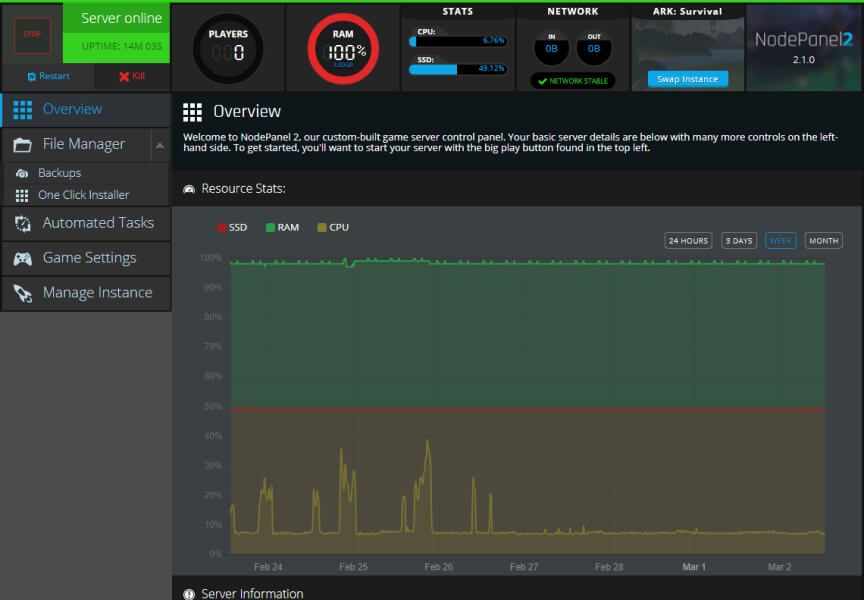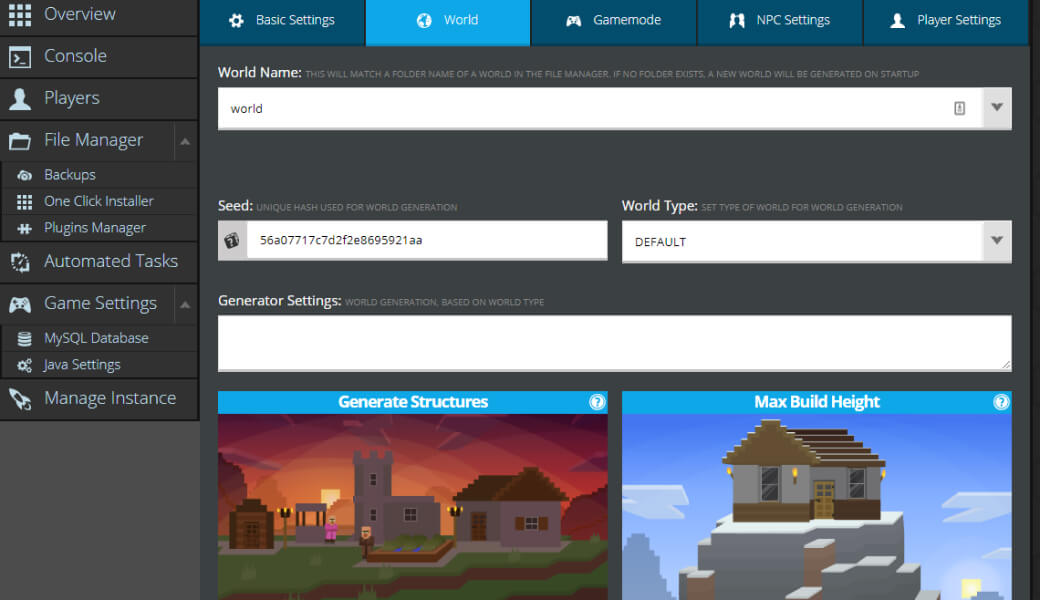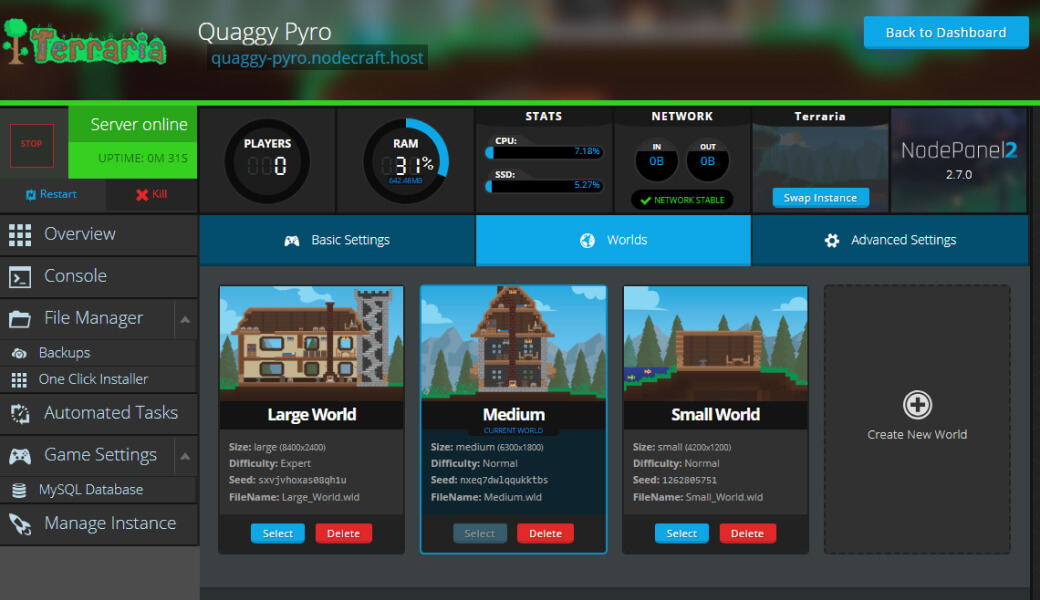Nodecraft


The combination of Cloudflare and Backblaze B2 Cloud Storage saves Nodecraft almost 85% each month on the data storage and egress costs versus Amazon S3.
James Ross, Co-Founder/CTO, Nodecraft
James Ross, the CTO of Nodecraft, and his colleagues built an online, multiplayer gaming service that earned rave reviews. Thanks to cloud technology, they were able to scale to match their growing popularity seamlessly. But while they grew, so did their bill for cloud storage and egress fees—at a rate that threatened their operation.
Nodecraft relied on Amazon S3 to store their game and server files, and Cloudflare to transmit those files to customers around the world. Ross realized he could get the same performance as S3 with Backblaze B2 Cloud Storage, but at 1/5 the cost—and that he could erase his egress fees to Cloudflare thanks to Backblaze’s membership in the Bandwidth Alliance.
The team migrated to B2 Cloud Storage with zero service disruption. Their cloud storage bill shrunk to only a 1/5 of what it was before, and their bill to shift content to Cloudflare was completely eliminated. Overall, Nodecraft shaved 85% off of their monthly bill for storage and egress—savings they can now invest to grow their service to happy gamers around the world.

Nodecraft is a small team of gamers who believe that online, multiplayer gaming can be better. Their platform is built to allow consumers to get in-game faster and easier than they could with the antiquated, off-the-shelf systems that other game providers use.

James Ross and his colleagues at Nodecraft had just agreed to an aggressive expansion of their business. Previously, they found success by providing game server hosting for the “Minecraft” gaming community, and grew substantially based on a strong following in the gaming world and a reputation for providing services at fixed, fair prices. Yet the team knew that they would have to diversify their portfolio to keep growing—and that day had arrived. They decided to rewrite their core product, Nodepanel, into a more dynamic, cloud-multiplayer platform and dramatically expand the number of games their hosting servers could support.
As Nodecraft’s CTO, Ross knew his team could make everything work technically; and as a part-time community manager, he believed gamers would flock to their newly supported games. Ross only had one worry: could Nodecraft afford to be successful with Amazon S3 as their cloud storage provider?


Nodecraft realized that with a single change they could dramatically reduce their cloud storage fees, and all egress fees as well.
On January 17, 2018, Nodecraft launched the NodePanel 2 game server management platform with support for 12 games. They met with tremendous success.
With NodePanel 2, customers who had previously enjoyed Nodecraft’s “Minecraft” hosting service could now instantly swap their server to any supported game. To enable this, Nodecraft provided a server save-state system that captured and stored all of the game settings, world files, player status information, and more, so that they could be archived and instantly restored at any time in the future. This allowed teams of gamers to swap into a new game server environment instantly, without fear of losing their hard-earned experience, loot, and world builds they worked on with their friends.
Nodecraft’s customers could host a gaming team playing “Minecraft” on Saturday, “Terraria” on Sunday, and “Counter Strike: GO” on weeknights—all employing the same easy-to-use service. And as Nodecraft’s popularity grew, the number of games they were able to support more than doubled in the first year alone, welcoming increasingly broad groups of gamers to their service.
But the state of each game and all of the associated files needed to restore the game environment ranged in size from 500MB to over 15GB. And any customer around the world could decide to re-enter a game they had stored at any time and expect to retrieve all of that content immediately. The necessity of on-demand availability for a limitless number of huge files required robust backend work by the Nodecraft team to ensure they could meet their customer’s expectations.


Ross only had one worry: could Nodecraft afford to be successful with Amazon S3 as their cloud storage provider?
A critical strategy at Nodecraft was to structure their service to provide the fastest possible delivery to customers all over the world. Almost from the beginning, they built their game distribution on Cloudflare’s cloud network platform, which spans some 200 cities in more than 90 countries and provides incredibly fast access to a majority of the globe. Nodecraft also relied on Cloudflare for DDoS protection, their Argo Smart Routing for intelligent network routing, and more.
Yet, with the introduction of game swapping, data storage for all of the customer server game-save files became a concern. When a customer saved a game, it was stored in Amazon S3. Later, when the customer wanted to play that game again, the saved version had to be retrieved from S3 and transported over the Cloudflare CDN to the appropriate Nodecraft game server. For each of these transactions, Nodecraft paid Amazon for storing customer files in S3, and also paid S3 an egress fee to download the game to Cloudflare. Game swapping created more data files to store for each customer, and each file incurred an egress fee when downloaded.
Nodecraft, which prided itself on providing its service levels at a fixed price, now found that storage and egress costs were eating away at their bottom line.


With these savings, Nodecraft is free to continue adding new titles without worrying about their popular game-swapping feature crushing their bottom line, all at the price and service level customers have come to expect.
Enter the Bandwidth Alliance, a group of forward-thinking cloud and networking companies (including Cloudflare and Backblaze) committed to discounting or waiving data transfer fees for their shared customers. The Nodecraft team was already familiar with Cloudflare and what it could do for them, but Backblaze’s offer of cloud storage for less than a 1/5 the cost of Amazon S3 was new to them, and highly intriguing. In addition, thanks to the Bandwidth Alliance, Backblaze charges $0.00 in egress fees to download data to Cloudflare, effectively creating a zero-cost data movement bridge from Backblaze B2 Cloud Storage to Cloudflare’s global content delivery network.
Nodecraft realized that, with a single change, they could dramatically reduce their cloud storage fees, and all egress fees as well, but first they would need to shift their existing customer backup files to Backblaze.
The DevOps team swung into action, and with a combination of Python tools, shell scripting, and the Nodecraft and Backblaze APIs, they moved more than 23TB of customer backup files from Amazon S3 to B2 Cloud Storage in only seven hours.
Ross estimates that combining Cloudflare and Backblaze B2 Cloud Storage saves him almost 85% on his data storage and egress bills each month versus Amazon S3. With these savings, Nodecraft is free to continue adding new game titles to their platform without worrying about their wildly popular game-swapping feature crushing their bottom line, all at the price and service level their customers have come to expect.

The Backblaze B2 Storage Cloud is purpose-built for ease. It offers always-hot, S3 compatible object storage that supports your workflows via third-party software integrations, APIs, CLI, and web UI. And it’s priced for easy affordability at rates a fraction of other cloud providers. Businesses in more than 175 countries use the platform to host content, build and run applications, manage media, back up and archive data, and protect and recover from ransomware.